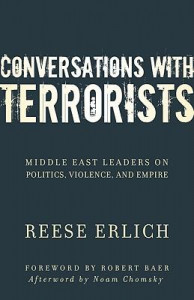
KBOO is a proud media sponsor for Reese Erlich's lecture:
January 28th, 2011 at 7 PM
Multicultural Center,
Smith Memorial Union Building
Portland State University
Reese Erlich, renown investigative journalist and foreign correspondent, will present his latest book "Conversations with Terrorists".
This event is sponsored by American Iranian Friendship Council, Americans United for Palestinian Human Rights, and Sociology of Islam at PSU.
Reese Erlich’s history in journalism goes back over 40 years. He first worked as a staff writer and research editor for Ramparts, a national, investigative reporting magazine published in San Francisco from 1963 to 1975. He taught journalism at Bay Area universities for ten years and currently works as a full-time print and broadcast journalist. He reports regularly for a variety of radio networks, including National Public Radio, CBC, ABC (Australia), Radio Deutsche Welle, as well as KQED Radio News and The California Report.
He's touring with his new book: "Conversations with Terrorists: Middle East Leaders on Politics, Violence and Empire. According to "Publishers Weekly (07/26/2010), Erlich (author of The Iran Agenda) questions how the U.S. has dealt with terrorist threats since 2001, suggesting that by "labeling all opponents as terrorists," the government has "from a practical perspective ... rendered the term 'terrorism' meaningless." Using decades of his personal reporting, personal interviews, and new research, Erlich emphasizes the stark differences between the nihilism of al-Qaeda and the political aspirations of organizations such as Hamas and Hezbollah. He urges the U.S. to "recognize the difference between isolated fanatics and groups fighting for legitimate causes," concluding that such a policy shift would "do more to undermine groups such as al Qaeda than all U.S. invasions combined." Although the patchwork of interviews, analysis, background information, and policy prescriptives in such a slender book can be overwhelming, Erlich efficiently unearths some of the most problematic and overlooked narratives about terrorism.


